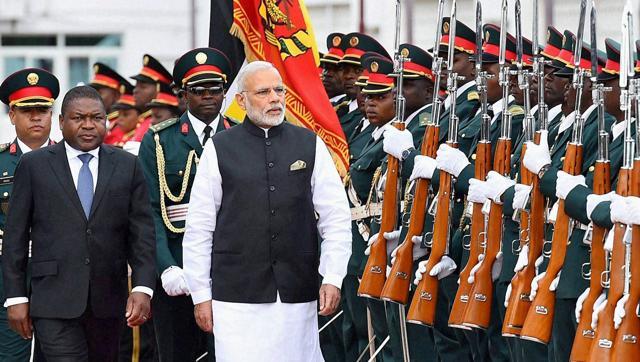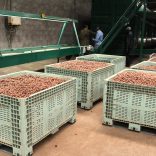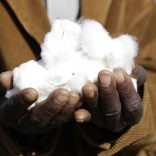Mozambique: Secretary of State highlights macadamia production in Bananalândia, Boane district - ...
India visit was missed opportunity to help Mozambique’s peasant farmers – Hanlon

PTI / India Prime Minister Narendra Modi and Mozambique President Filipe Jacinto Nyusi inspect a guard of honour during a Ceremonial Welcome at Presidential Office in Maputo, Mozambique on Thursday.
On a one-day visit to Mozambique on 7 July, Indian Prime Minister Narendra Modi signed a Memorandum of Understanding to increase the import of pulses. Mozambique is expected to export 100,000 tonnes of pigeon peas to India this year, worth more than $60 mn, and India wants to double this in four years. (Zitamar 6 July) Pigeon pea (feijao boer) is only a peasant crop, entirely for export to make dal (dhal).
Details of the MoU have not been released, but it obviously has much less in it than India had wanted. In a briefing before the visit, Amar Sinha, External Affairs Ministry secretary (economic relations) said the MoU will “ensure that the Mozambique farmers are paid their minimum support prices,” and that “India may support a network of farmers in the African country who will be given logistical support, technology, and seeds.” He said “pulses will be procured from them through government agencies”. (Asian Age 5 July, Financial Express 6 July)
India assumed that like most countries (including India itself), Mozambique had a government agricultural marketing board and that a government-to-government agreement could be made to buy pigeon peas. But Mozambique was forced by the IMF and donors to close its marketing board and is not allowed to have “minimum support prices”. Thus the government has no commercial relationship with peasant farmers – and, indeed, apparently has no way of thinking about this, so it could not respond to the Indian proposal. The final MoU is vague and says buying will be “either through private channels or government-to-government sales through state agencies nominated by the two countries.”
The advance team for the Modi visit met with the Export Marketing Company (EMC) in June. EMC is the main promoter and exporter of pigeon pea. It already has three pigeon pea processing factories in Mozambique and an Indian contract will probably be with them. Guilherme Machado, country director of EMC, says that improved seeds and extension services could raise productivity from 500 kg per hectare to 1.8 tonnes/ha or more. New seed varieties would be more drought resistance and produce peas with a thinner skin, which gains a higher price in the India market.
India imports nearly 6 million tonnes of pulses per year and prices jumped dramatically this year, causing political problems for the government. The Indian government wants a more assured supply and is clearly offering significant support in exchange, but Mozambique appears to have no way of responding. One model is already used for tobacco, under which an international tobacco trading company has exclusive rights to buy tobacco in a district and in exchange guarantees to buy and through a contract farming system provides seeds, fertilizer and extension services on credit. Mozambique Leaf Tobacco (MLT) is part of a huge multinational and used its own money (even to pay local bribes) and has made tobacco Mozambique’s biggest agricultural export. A similar system could easily be used for pigeon pea, because, like tobacco, it does not have a local market. But EMC does not have the financial backing of a company the size of MLT, so to make contract farming work, government would probably need to share the risk with EMC (and to do so publicly, not in secret).
Unfortunately, there seems to be no one in government with the authority and knowledge to think creatively about supporting peasant farmers. So we end up with an MoU with vague hopes that EMC can double feijao boer exports and that India “may” help. Mozambique is losing out on tens of millions of dollars in potential peasant production – exactly the failure of support that Magid Osman is talking about.
+ The Modi visit also showed the success of the No to ProSavana campaign and other land campaigns. Originally the Indian government announced it wanted to lease land in Mozambique to grow pulses. But in his press briefing, Amar Sinha said the idea of leasing land to grow pulses had been dropped on the grounds that it is a “politically sensitive issue.”
By: Joseph Hanlon













Leave a Reply
Be the First to Comment!
You must be logged in to post a comment.
You must be logged in to post a comment.